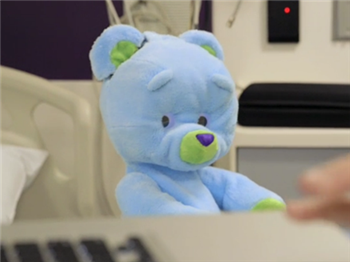
Here’s Huggable—Teddy Ruxpin for the new millennium. It’s a talking blue teddy bot designed to care for and comfort hospitalized children。
这就是抱抱熊(Huggable)——新千年的泰迪熊华斯比。它是一个会说话的蓝色机器人,为了关心和安慰住院的孩子们而设计。
The New York Times reported today it’s currently being used in a study that gathers kids’ physiological responses to various stress-alleviating stimuli to determine whether Huggable offers ill children therapeutic benefits or not. Eventually, that data will be integrated in the robo-bear to make it automated and able to respond to kids’ various needs。
据《纽约时报》报道,在某研究中该泰迪熊被用于收集孩子们应对各种压力缓解刺激的生理反应,以此来决定抱抱熊是否对病中儿童的治疗有好处。最终,这些数据将被整合到机器熊里,使它能够自动回复孩子们的各种需求。
Right now, the bear is more of a “high-tech puppet,” the Times writes. An adult down the hall controls the bear, serving as its voice, shooting the breeze with the young patient. The robot’s a collaboration between MIT’s Media Lab and Boston Children’s Hospital, which has invested half a million bucks to research social robots。
现在,这只熊远远不止是一个“高科技玩偶”那么简单。一个成人可以在走廊操控这只熊,通过它来发声和小病人们闲聊。这个机器人是麻省理工大学媒体实验室和波士顿儿童医院合作研发,投资50万美元的研究型社交机器人。
As with most robots, the ultimate goal is to get it to adapt to changing situations on its own, just as humans do. So maybe one day, if a child doesn’t respond to the bear’s jokes, it could shift strategies automatically. Switching to a calmer activity might help that particular child relax, for instance。
和绝大多数机器人一样,抱抱熊的终极目标是让他们能够像人类一样适应不断变化的情况。如此一来,也许某天,如果一个孩子听了熊的笑话没有笑出来,它可以自动转换策略。例如,切换成更为平和的活动模式,也许能帮助这个小孩放松下来。
Will robots be caring for our future offspring? If the tech’s up to snuff, maybe. After playing with Huggable, the young patient in the Times video says the bear suffered from lagged responses and limited motion—a major problem when they tried to play peek-a-boo。
机器人会照顾我们的后代吗?如果科技能达到一定水平的话,也许可以。在和抱抱熊玩耍过后,小病人们在《纽约时报》视频里说,这只熊反应滞后而且动作幅度有限,若他们想要和抱抱熊玩捉迷藏,这就会成为一个大问题。


